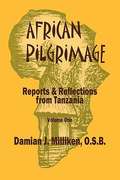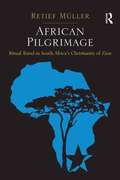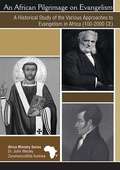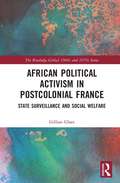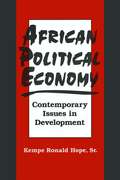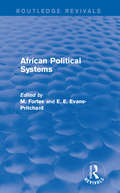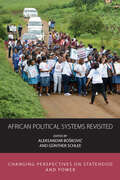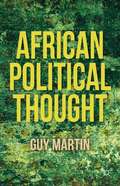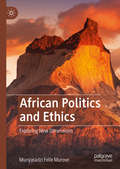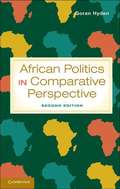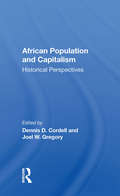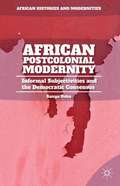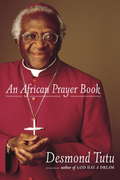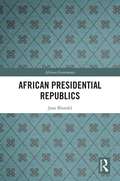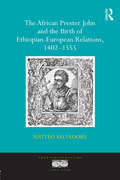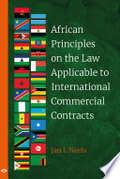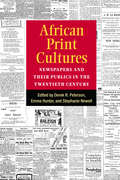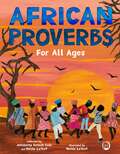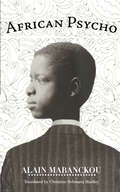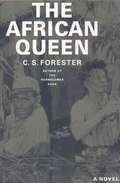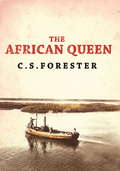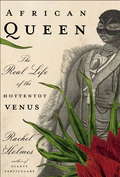- Table View
- List View
African Pilgrimage: Reports and Reflections from Tanzania (Volume One, 1960-1988)
by Damian J. Millikenthis is an autobiographical account of Fr. Damian J. Milliken's first twenty-eight years as a missionary in Tanzania. Each chapter contains several stories and/or essays about the land, the people and their culture.
African Pilgrimage: Ritual Travel in South Africa's Christianity of Zion
by Retief MüllerYears after the end of Apartheid South Africa remains racially polarized and socially divided. In this context pilgrimage and travelling rituals serve to help those who often find themselves at the bottom end of the social ladder to make sense of their world. This book describes a South Africa that is made up of a number of different fragmented worlds. The focus is on the Zion Christian Church, one of the largest religious movements in southern Africa, and a good example of indigenized African Christianity. Pilgrimage plays an important role in reintegrating some of those fragmented worlds into something approaching wholeness. This book tells the story of how the enduring ritual of pilgrimage is transforming African religion, along with the lives of ordinary South Africans.
An African Pilgrimage on Evangelism
by John KurewaHow easily we forget that it was Africans who brought the gospel to Africa, not foreign missionaries! Evangelism has always been central to African Christianity, ever since Egyptians and Libyans returned home from Jerusalem following the day of Pentecost (Acts 2). In this brief history of the church in Africa, Dr. John Kurewa highlights the major approaches to evangelism that the church employed over the centuries, for better and for worse. Then, in historical context, Kurewa zeroes in on those distinctive methods of evangelism, proclamation and disciple formation that shaped a diverse yet vibrant African Methodism. Thanks to this historical review, we stand to gain fresh vision for ministries of evangelism that truly can fulfill the Great Commission--to make disciples of Jesus Christ.
African Political Activism in Postcolonial France: State Surveillance and Social Welfare (The Routledge Global 1960s and 1970s Series)
by Gillian GlaesAfrican Political Activism in Postcolonial France engages with several areas of scholarly inquiry, ranging from the study of immigrants to the investigation of surveillance and the legacy of colonialism. Within migration studies, many important analyses have focused on integration, yielding critical contributions to our understanding of immigration and identity. This work moves in a different direction. Factoring in the dynamics of colonialism, decolonization, and their effect on immigrant political activism and state policy in the postcolonial, Cold War era reveals that immigrants from francophone Sub-Saharan Africa were key players who shaped the development of public policy toward immigrants. Through this approach, we can understand how republicanism, colonial ideology, immigration policy, and immigrant political activism intersected in the post-colonial era, shaping the reception of African workers and affecting their lives and experiences in France.
African Political Economy: Contemporary Issues in Development
by Kempe Ronald Sr.This is a multidisciplinary book that analyses the problems and issues of development in Africa along with the attempts at, and outcomes of, policy reform measures that have been implemented to surmount those problems. Topics covered include the economic crisis in Africa, urbanisation and urban management, uneven development, the socio-economic context of AIDS, bureaucratic corruption and reform, and proposed development solutions.
African Political Systems
by Meyer Forbes E. E. Evans-PritchardAfrican Political Systems is a foundational work in the field of anthropology and political science, edited by Meyer Fortes and E. E. Evans-Pritchard. First published in 1940, the book offers a comparative study of governance structures across various African societies, challenging earlier Western assumptions about political organization in non-Western cultures.Through a series of in-depth case studies, the book explores the diversity of political systems in African societies—ranging from stateless societies with decentralized authority to centralized kingdoms with hierarchical governance. It covers communities such as the Nuer, Zulu, and Bemba, revealing how political order is maintained through kinship ties, rituals, alliances, and local customs. Each chapter demonstrates how these systems reflect the unique cultural, social, and economic conditions of the communities they govern.The editors introduce key anthropological concepts, including the distinction between "primitive" and "modern" political systems, although later scholarship has criticized some of these categories. Nevertheless, African Political Systems remains a pioneering effort in understanding political organization outside the Western context, and it continues to influence research in anthropology, history, and political theory.With its rich ethnographic insights, the book offers readers an invaluable perspective on governance, authority, and social cohesion across Africa, making it an essential text for those interested in cross-cultural political studies.
African Political Systems (Routledge Revivals)
by M. Fortes E. E. Evans-PritchardFirst published in 1940 and this edition in 1987, this book is a comparative study of African political institutions. It describes different types of social organisation that are found in a number of African societies and analyses the principles underlying these traditional forms of government. The volume represents the results of field studies carried out by trained investigators in a number of areas, and was compiled and edited under the auspices of the International African Institute. It will be of interest to students, anthropologists and administrators.
African Political Systems Revisited: Changing Perspectives on Statehood and Power (Integration and Conflict Studies #26)
by Aleksandar Bošković Günther SchleeReexamining a classical work of social anthropology, African Political Systems (1940), edited by Fortes and Evans-Pritchard, this book looks at the colonial and academic context from which the work arose, as well as its reception and its subject matter, and looks at how the work can help with analysis of current politics in Africa. This book critically reflects upon the history of anthropology. It also contributes to a political anthropology which is aware of its antecedents, self-reflexive as a discipline, conscious of pitfalls and biases, and able to locate itself in its academic, social and political environment.
African Political Thought
by Guy MartinFocusing on individual political thinkers and beginning with indigenous African political thought, the book successively examines African nationalism, African socialism, populism and Marxism, Africanism and pan-Africanism, concluding with contemporary perspectives on democracy, development and the African state.
African Politics and Ethics: Exploring New Dimensions
by Munyaradzi Felix MuroveIn this book, Munyaradzi Felix Murove explores African traditional ethical resources for African politics. Arguing that African ethics is integral to African post-colonial political contentious discourse, Murove invites the reader to reflect on various problematic political issues in post-colonial Africa and how African ethics has been applied in these situations. Starting with a succinct discussion of the scope of African ethics, he discusses how African ethical values have been applied by post-colonial politicians in the reconstruction of their societies. Further, Murove looks critically at the issue of African poverty and how the ethic of regional integration and economic cooperation among post-colonial African nation-states has been instrumental to efforts aimed at overcoming the scourge of poverty. The main question this book seeks to answer is: Are African traditional ethical values a panacea to modern African political problems?
African Politics in Comparative Perspective
by Goran HydenThis revised and expanded second edition of African Politics in Comparative Perspective reviews fifty years of research on politics in Africa and addresses some issues in a new light, keeping in mind the changes in Africa since the first edition was written in 2004. The book synthesizes insights from different scholarly approaches and offers an original interpretation of the knowledge accumulated in the field. Goran Hyden discusses how research on African politics relates to the study of politics in other regions and mainstream theories in comparative politics. He focuses on such key issues as why politics trumps economics, rule is personal, state is weak and policies are made with a communal rather than an individual lens. The book also discusses why in the light of these conditions agriculture is problematic, gender contested, ethnicity manipulated and relations with Western powers a matter of defiance.
African Population And Capitalism: Historical Perspectives
by Dennis D. CordellThis is a synthesis of case studies and theory which takes issue with established African demographic theory, emphasising that demography is an historical process, a permanent and varied adaptation to social and economic change. The book covers 20 African societies in the sub-Saharan region, examining not the effects of slavery, colonialism and capitalism on each, but also the resistance and resilience of indigenous African institutions and individuals.
African Postcolonial Modernity: Informal Subjectivities And The Democratic Consensus (African Histories and Modernities)
by Sanya OshaAfrican cultures and politics remain significantly affected by precolonial and postcolonial configurations of modernity, as well as hegemonic global systems. This project explores Africa's conversation with itself and the rest of the world, critiquing universalist notions of democratization.
An African Prayer Book
by Desmond TutuThe great Archbishop of Capetown, South Africa, shares with us the simple but profound secrets of his extraordinary spiritual strength by unveiling his very own book of prayer. Prayer, our conversation with God, needs no set formulas or flowery phrases. It often needs no words at all. But for most believers, the words of others can be a wonderful aid to devotion, especially when these words come front faithful fellow pilgrims. The African Prayer Bookis just such an aid, for in this collection all the spiritual riches of the vast and varied continent of Africa are bravely set forth. Here we may delight in Solomon's splendid encounter with the Queen of Sheba, overhear the simple prayer of a penniless Bushman, and glory in the sensuous sonorities of the mysterious liturgies of the Egyptian Copts. Here are Jesus' own encounters with Africa, which provided him refuge at the beginning of his life (from the murderous King Herod) and aid at its end (in the person of Simon of Cyrene, who helped Jesus carry his cross). Here are the prayers of some of the greatest among the mothers and fathers of the Church -- Monica, Augustine, Clement of Alexandria, Cyprian of Carthag -- as well as the prayers from the African diasporas of North America and the Caribbean. From thunderous multi-invocation litanies to quiet meditations, here are prayers that every heart can speak with strength and confidence. Archbishop Desmond Tutu, who is for millions the very soul of Africa, is our guide on this unique spiritual journey. His introduction is destined to become a classic, his characteristic energy and optimism light our way, and the words of his favorite prayers (many composed by the Archbishop himself) will stay with us forever.
The African Prayer Book
by Desmond TutuThis book contains a collection of prayers from a variety of traditions in Africa. They are organized according to category or usage--devotional, hymns, etc.--and their sources range from African folk poems to prayers from Church fathers such as St. Augustine.
African Presidential Republics (African Governance)
by Jean BlondelThis book provides a systematic assessment of the behaviour of some relatively successful presidents in African presidential republics, examining the part played by presidents in the development of their countries. Using two groups of case studies, African Presidential Republics examines the variations between presidential republics within Africa since decolonisation. Jean Blondel divides the ten countries studied into those in which presidents had always been elected regularly, namely Botswana, Mozambique, Namibia, Senegal and Tanzania, and those in which there was irregularity in the appointment of presidents, namely Benin, Uganda, Ghana, Liberia and Nigeria. The case studies analyse the manner in which presidential republics have manifested themselves in Africa, exploring the argument that the presidential republic is one of the key institutional arrangements likely to lead societies towards development. African Presidential Republics will be of interest to students and scholars of African politics, comparative politics and political leadership.
The African Prester John and the Birth of Ethiopian-European Relations, 1402-1555 (Transculturalisms, 1400-1700)
by Matteo SalvadoreFrom the 14th century onward, political and religious motives led Ethiopian travelers to Mediterranean Europe. For two centuries, their ancient Christian heritage and the myth of a fabled eastern king named Prester John allowed the Ethiopians to engage the continent's secular and religious elites as peers. Meanwhile, back home the Ethiopian nobility came to welcome European visitors and at times even co-opted them by arranging mixed marriages and bestowing land rights. The protagonists of this encounter sought and discovered each other in royal palaces, monasteries, and markets throughout the Mediterranean basin, the Red Sea, and the Indian Ocean littoral, from Lisbon to Jerusalem and from Venice to Goa. Matteo Salvadore's narrative takes the reader on a voyage of reciprocal discovery that climaxed with the Portuguese intervention on the side of the Christian monarchy in the Ethiopian-Adali War. Thereafter, the arrival of the Jesuits at the Horn of Africa turned the mutually beneficial Ethiopian-European encounter into a bitter confrontation over the souls of Ethiopian Christians.
African Principles on the Law
by Jan L NeelsThis booklet contains the first draft of the envisaged African Principles on the Law Applicable to International Commercial Contracts. The proposal could be used by national legislators on the continent and African economic integration organisations, particularly the African Union, in, respectively, domestic legislation and regional or supranational laws of a soft or binding nature. The existence of a reliable transnational legal infrastructure in respect of international commercial law, including commercial private international law, is a prerequisite for investor confidence, inclusive economic growth, sustainable development, and the ultimate alleviation of poverty on the African continent. The instrument may contribute to sustainable growth on a long-term basis. The regulation of private international law of contract is essential to the further development of the African Continental Free Trade Area.
African Print Cultures: Newspapers and Their Publics in the Twentieth Century
by Emma Hunter Derek Peterson Steph NewellThe essays collected in African Print Cultures claim African newspapers as subjects of historical and literary study. Newspapers were not only vehicles for anticolonial nationalism. They were also incubators of literary experimentation and networks by which new solidarities came into being. By focusing on the creative work that African editors and contributors did, this volume brings an infrastructure of African public culture into view. The first of four thematic sections, "African Newspaper Networks," considers the work that newspaper editors did to relate events within their locality to happenings in far-off places. This work of correlation and juxtaposition made it possible for distant people to see themselves as fellow travellers. "Experiments with Genre" explores how newspapers nurtured the development of new literary genres, such as poetry, realist fiction, photoplays, and travel writing in African languages and in English. "Newspapers and Their Publics" looks at the ways in which African newspapers fostered the creation of new kinds of communities and served as networks for public interaction, political and otherwise. The final section, "Afterlives, " is about the longue durée of history that newspapers helped to structure, and how, throughout the twentieth century, print allowed contributors to view their writing as material meant for posterity.
African Proverbs for All Ages
by Johnnetta Betsch Cole Nelda LaTeefAfrican Proverbs for All Ages is a beautifully-illustrated, engaging picture book about the power of proverbs, how they evolve over time, and the wisdom of various cultures in Africa.It has been said that a proverb is a short sentence based on long experience.Whether you are young or old, proverbs can open your mind to a whole new way of seeing the world. We underestimate children when we assume they are incapable of understanding metaphor and deeper meaning. There are multiple ways that children learn, but for each method by which they learn, they need their imagination engaged and their visual sensibilities ignited. And as adults, we underestimate ourselves when we allow our lives to be about practical matters only. Proverbs can stir our soul and spark our imagination. --Johnnetta Betsch Cole, Ph.D. President Emerita of Spelman and Bennett CollegesIn African Proverbs for All Ages, noted anthropologist and educator Dr. Johnetta Betsch Cole and award-winning illustrator Nelda LaTeef invite children and adults to explore and reflect on complex notions about relationships, identity, society, and the human condition.A Roaring Brook Press and Oprah Book
African Psycho
by Alain MabanckouFinalist for the Man Booker International Prize 2015&“The novel with which [Mabanckou] cemented his reputation as one of French-language fiction&’s leading lights . . . Black as pitch and bitter as wormwood, a razor-sharp satire in which the trials of a would-be serial killer are played for laughs.&” —Times Literary SupplementIts title recalls Bret Easton Ellis&’s infamous book, American Psycho. But while Ellis&’s narrator was a blank slate, the protagonist of African Psycho is a quivering mass of lies, neuroses, and relentless internal chatter. Gregoire Nakobomayo, a petty criminal, has decided to kill his girlfriend Germaine. He&’s been planning the crime for some time. But the act of murder requires a bit of psychological and logistical preparation. Luckily, he has a mentor to call on, the far more accomplished serial killer Angoualima. The fact that Angoualima is dead doesn&’t prevent Gregoire from holding lengthy conversations with him. Little by little, Gregoire interweaves Angoualima&’s life and criminal exploits with his own. Continuing with the plan despite a string of botched attempts and abject failures, Gregoire&’s final shot at offing Germaine leads to his abrupt unraveling. Lauded in France for its fresh and witty style, African Psycho&’s inventive use of language surprises and delights, relieving the reader through an injection of humor into a plainly disturbing subject.
The African Queen
by C. S. ForesterFirst published in 1935, The African Queen is the story of Charlie Allnutt and Rose Sayer, a disheveled trader and an English spinster missionary, who are thrown together when World War I reaches the heart of the African jungle. Fighting time, heat, malaria, and bullets, they escape on a rickety steamboat, where they fall in love and hatch an outrageous military plan of their own. The story was immortalized in the 1951 film starring Katharine Hepburn and Humphrey Bogart. The African Queen is packed with vintage Forester drama--unrelenting suspense, reckless heroism, impromptu military maneuvers, leaky boats, near-death experiences, and a good old-fashioned love story to boot.
The African Queen
by C. S. ForesterA classic tale of love and adventure from the author of the Captain Hornblower series. The film adaptation, which starred Katharine Hepburn and Humphrey Bogart, became one of the most popular films ever made.The African Queen is an old, dirty, ugly, unreliable steamboat - not the kind of boat anyone would take down a dangerous river through the jungles of Central Africa. But Rose Sayer and Charlie Allnut do just that. Why do they do it? The First World War has just begun, and Rose has a crazy plan. She and Charlie set off down the river and come close to death many times, but they survive all dangers - except the danger of falling in love.
The African Queen
by C. S. ForesterA classic tale of love and adventure from the author of the Captain Hornblower series. The film adaptation, which starred Katharine Hepburn and Humphrey Bogart, became one of the most popular films ever made.The African Queen is an old, dirty, ugly, unreliable steamboat - not the kind of boat anyone would take down a dangerous river through the jungles of Central Africa. But Rose Sayer and Charlie Allnut do just that. Why do they do it? The First World War has just begun, and Rose has a crazy plan. She and Charlie set off down the river and come close to death many times, but they survive all dangers - except the danger of falling in love.
African Queen: The Real Life of the Hottentot Venus
by Rachel HolmesSaartjie Baartman was twenty-one years old when she was taken from her native South Africa and shipped to London. Within weeks, the striking African beauty was the talk of the social season of 1810–hailed as “the Hottentot Venus” for her exquisite physique and suggestive semi-nude dance. As her fame spread to Paris, Saartjie became a lightning rod for late Georgian and Napoleonic attitudes toward sex and race, exploitation and colonialism, prurience and science. In African Queen, Rachel Holmes recounts the luminous, heartbreaking story of one woman’s journey from slavery to stardom. Born into a herding tribe known as the Eastern Cape Khoisan, Saartjie was barely out of her teens when she was orphaned and widowed by colonial war and forced aboard a ship bound for England. A pair of clever, unscrupulous showmen dressed her up in a body stocking with a suggestive fringe and put her on the London stage as a “specimen” of African beauty and sexuality. The Hottentot Venus was an overnight sensation. But celebrity brought unexpected consequences. Abolitionists initiated a lawsuit to win Saartjie’s freedom, a case that electrified the English public. In Paris, a team of scientists subjected her to a humiliating public inspection as they probed the mystery of her sexual allure. Stared at, stripped, pinched, painted, worshipped, and ridiculed, Saartjie came to symbolize the erotic obsession at the heart of colonialism. But beneath the costumes and the glare of publicity, this young Khoisan woman was a person who had been torn from her own culture and sacrificed to the whims of fashionable Europe. Nearly two centuries after her death, Saartjie made headlines once again when Nelson Mandela launched a campaign to have her remains returned to the land of her birth. In this brilliant, vividly written book, Rachel Holmes traces the full arc of Saartjie’s extraordinary story–a story of race, eros, oppression, and fame that resonates powerfully today.
